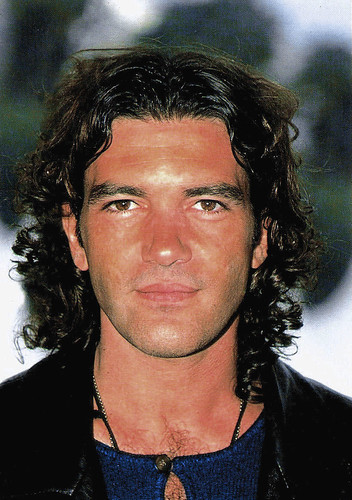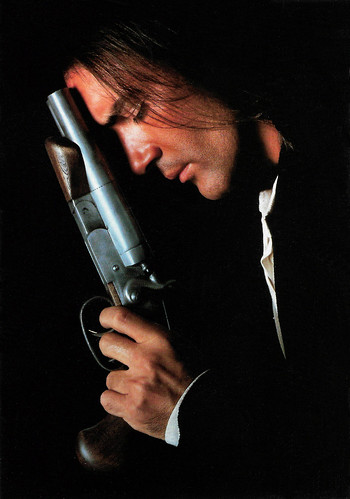
Spanish postcard by Colección 'Estrellas de actualidad' Cacitel, S.L., no. 109, 1990.

British postcard by Heroes Publishing Ltd, London, no. SPC 2753.

British postcard by Exclusive Collectors' Artcard. Photo: Geffen Pictures. Antonio Banderas in Interview with the Vampire (Neil Jordan, 1994). Caption: Armand (Antonio Banderas) heads the 'Theatre of the Vampires' where human sacrifices provide the nightly entertainment.

British postcard by Box Office, no. BO 033. Antonio Banderas in Desperado (Roberto Rodriguez, 1995).
Innovative and sexually provocative films
José Antonio Domínguez Banderas was born in Málaga, Spain, in 1960. He was the son of Ana Banderas, a school teacher, and José Domínguez, a police officer in the Guardia Civil. He has one younger brother, Francisco. He took his mother's surname as his stage name.
He initially wanted to be a soccer player, but his dream ended when he broke his foot at age 14. At that time he developed a passion for theatre after seeing the stage production of 'Hair'. Banderas began his acting studies at the School of Dramatic Art in Málaga and made his acting debut at a small theatre in Málaga.
He was arrested by the Spanish police for his performance in a play by Bertolt Brecht, because of the political censorship under the rule of General Francisco Franco. Banderas spent a whole night at the police station. He had three or four of such arrests while he was working with a small theatre troupe that toured all over Spain and was giving performances in small-town theatres and on the street.
In 1981, at the age of 19, he moved to Madrid in pursuit of an acting career. There he joined the troupe at the National Theatre of Spain, becoming the youngest member of the company. Banderas' stage performances caught the attention of film director Pedro Almodóvar, who cast the young actor in Pestañas postizas (Enrique Belloch, 1982), produced by Almodóvar.
Banderas and Almodovar joined forces in making innovative and sexually provocative films during the 1980s. He played a gay Islamic terrorist in Laberinto de pasiones/Labyrinth of Passion (Pedro Almodóvar, 1982). In Matador (Pedro Almodóvar, 1986), he played a troubled young man who is confused about his sexuality. Banderas made headlines in Spain with his performance as a psychotic gay stalker, making his first male-to-male on-screen kiss in Almodovar's La ley del deseo/Law of Desire (1987, Pedro Almodóvar) with Carmen Maura.
Banderas's long and fruitful collaboration with Almodóvar eventually prepared him for international recognition that came with his work in the Academy Award-nominated film Mujeres al borde de un ataque de nervios/Women on the Verge of a Nervous Breakdown (Pedro Almodóvar, 1988). He had his breakthrough with the controversial ¡Átame!/Tie Me Up! Tie Me Down! (Pedro Almodóvar, 1989) as mental patient Ricky, who kidnaps a porn star (Victoria Abril) and keeps her tied up until she returns his love.
Other Spanish films in which he appeared were El señor Galíndez (Rodolfo Kuhn, 1984) starring Héctor Alterio, Los zancos/The Stilts (Carlos Saura, 1984) with Laura del Sol and Fernando Fernán Gómez, Si te dicen que caí/If They Tell You I Fell (Vicente Aranda, 1989) with Victoria Abril, and Terra Nova (Calogero Salvo, 1991).
In 1991 he got also international attention as an unwitting object of Madonna's affection in the documentary Madonna: Truth or Dare (Alek Keshishian, Mark Aldo Miceli, 1991).

Spanish postcard by Novo Graf for Lauren Films. Photo: publicity still for El placer de matar (Félix Rotaeta, 1988).

Italian postcard by Edibas, no. 582. Photo: Olympia.

British postcard by Underground, no. BO 115.

Italian postcard in the World Collection by Edibas s.r.l., Torino, no. P.c. 716. Photo: Olympia.

American postcard by Fotofolio. Photo: Herb Ritts, 1994.
A shimmering gunslinger
In 1992 Antonio Banderas made his Hollywood debut with The Mambo Kings (Arne Glimcher, 1992) as a soulful Cuban trumpeter opposite Armand Assante. Because he did not speak English at that time, his dialogue for the film was taught to him phonetically. At AllMovie, Rebecca Flint Marx writes: “Banderas still managed to turn in a critically praised performance as a struggling musician.”
He then shot to international fame with his sensitive performance as the lover of Tom Hanks' AIDS-infected lawyer in Philadelphia (Jonathan Demme, 1993).
During the following years, he appeared in several major Hollywood releases. He played a substantial role as a sexy European vampire opposite Tom Cruise and Brad Pitt in the film adaptation of Anne Rice’s Interview with the Vampire: The Vampire Chronicles (Neil Jordan, 1994).
Banderas had a box office hit with his starring role as the shimmering gunslinger El Mariachi in Desperado (Roberto Rodriguez, 1995). He starred as ubiquitous narrator Che alongside Madonna as Eva Peron in Evita (Alan Parker, 1996), an adaptation of the musical by Andrew Lloyd Webber and Tim Rice.
He had another box office success with his role as the legendary masked swordsman Zorro in The Mask of Zorro (1998, Martin Campbell), opposite Anthony Hopkins and Catherina Zeta-Jones. Banderas was the first Latino to play the Mexican swashbuckler.
Banderas' debut as a director was the interesting black comedy Crazy in Alabama (1999), starring his wife Melanie Griffith. In 2000, Ridley Scott offered Banderas a part as a peasant in his film, Gladiator (Ridley Scott, 2000) and he reluctantly accepted but demanded $50,000 for the role - currently the world record for the highest salary of an extra.
In 2001, he collaborated again with Robert Rodriguez who cast him in the Spy Kids films. He also starred in the poor Original Sin (Michael Cristofer, 2001) with Angelina Jolie. In 2002, he starred in the equally poor Femme Fatale (Brian De Palma, 2002) opposite Rebecca Romijn-Stamos and in Frida (2002, Julie Taymor) with Salma Hayek.
He reprised his role as El Mariachi in the last installment of Robert Rodriguez' Mexico trilogy Once Upon A Time In Mexico (Roberto Rodriguez, 2003) with Johnny Depp and Salma Hayek.

French postcard by Sonis, no. C. 899. Photo: Zorro Productions / Tristar Pictures. Publicity still for The Mask of Zorro (Martin Campbell, 1998).

German postcard by Memory Cards, no. 497. Photo: publicity still for The Mask of Zorro (Martin Campbell, 1998).

German postcard by Memory Cards, no. 495. Photo: publicity still for The Mask of Zorro (Martin Campbell, 1998), with Catherina Zeta-Jones.

German postcard by Memory Cards, no. 496. Photo: publicity still for The Mask of Zorro (Martin Campbell, 1998), with Anthony Hopkins.
A sexy, macho swashbuckler
In 2003, Antonio Banderas returned to the musical genre, appearing to great acclaim in the Broadway revival of Maury Yeston's musical Nine, based on the film 8½, playing the prime role originated by the late Raúl Juliá. Banderas won both the Outer Critics Circle and Drama Desk awards and was nominated for the Tony Award for best actor in a musical.
Tweaking his image as a sexy, macho swashbuckler, Banderas next provided the pitch-perfect voice of the rapier-wielding Puss-in-Boots for Shrek 2 (Andrew Adamson, Kelly Asbury, Conrad Verno, 2004), Shrek the Third (Chris Miller, Raman Hui, 2007) and the last film in the Shrek franchise, Shrek Forever After (Mike Mitchell, 2010). The character became so popular on the family film circuit, that it became the protagonist of the spin-off film Puss in Boots: The Story of an Ogre Killer (Mike Mitchell, 2011).
In 2005, Banderas reprised his role as Zorro in The Legend of Zorro (Martin Campbell, 2005), though this was not as successful as the original. A year later, he starred in Take the Lead (Liz Friedlander, 2006), a high school-set movie in which he played a ballroom dancing teacher.
In 2010 he starred in the Woody Allen comedy You Will Meet a Tall Dark Stranger (Woody Allen, 2010). It was followed by Spy Kids 4: All the Time in the World (Robert Rodriguez, 2011).
In 2011 Banderas reteamed for the first time in two decades with Pedro Almodóvar in the Hitchcock-inspired La piel que habito/The Skin I Live In. Perry Seibert at AllMovie: "Luckily, Banderas continues to bring out Almodovar's most-outrageous impulses. You won't hear anyone coming out of this movie muttering, 'we've seen that story before.' But in a way, if you've kept up with Almodovar over the last three decades, you really have seen much of this movie before. Sure, the actual plot points are new, but the themes are quintessential Almodovar. His obsession with cross-dressing finds its seemingly natural conclusion in this film, and he continues to show how most men are slaves to their sexual desires, while most women are forever at the mercy of these unstable men."
The next year he appeared as a mysterious international espionage figure in the action thriller Haywire (Steven Soderbergh, 2012). Then, he appeared in a small role in Rodriguez's Machete Kills (Robert Rodriguez, 2013) and he joined Sylvester Stallone and his merry band of senior action heroes in The Expendables 3 (Patrick Hughes, 2014).
In 2019, Banderas had a new career highlight in the Spanish film Dolor y gloria/Pain and Glory (Pedro Almodóvar, 2019), which centers around an aging film director, played by Banderas who is suffering from chronic illness and writer's block as he reflects on his life in flashbacks to his childhood. The film has been described as semi-autobiographical, according to Almodóvar. Banderas won the Cannes Film Festival Award for Best Actor and was nominated for his first-ever Academy Award for Best Actor in a Leading Role for the film.
Banderas then starred in the Netflix film, The Laundromat (Steven Soderbergh, 2019) alongside Meryl Streep, and Gary Oldman, and in the fantasy adventure film Dolittle (2020) alongside Robert Downey Jr. In 2023, he will appear in the upcoming fifth Indiana Jones film with Harrison Ford, Mads Mikkelsen, and Toby Jones. He will reprise his voice role as Puss in Boots in the sequel Puss in Boots: The Last Wish.
Antonio Banderas divorced his first wife, actress Ana Leza in 1996, and married Melanie Griffith that same year. They had met a year earlier while shooting the romantic comedy Two Much (Fernando Trueba, 1995). Their romance on the set helped the film set box-office records in Spain. In June 2014 Griffith and Banderas announced their separation after a marriage of 18 years. They have a daughter, Stella Banderas (1996). Despite being divorced Banderas and Griffith remain on strong terms, remaining friends.
TCM: "Handsome, charismatic, and undeniably talented, Banderas rightfully earned his place as one of cinema's greatest leading men." Antonio Banderas shares time between his two residencies, one in the United States and one in the South of Spain. He has invested his movie earnings in Andalusian products and owns 50% of a winery in Northern Spain called Anta Banderas which makes red and rose wines.

British postcard by Box Office, no. BO 085. Antonio Banderas in Desperado (Roberto Rodriguez, 1995).

British postcard. Antonio Banderas in Desperado (Roberto Rodriguez, 1995). Caption: He came back to settle the score with someone. Anyone. EVERYONE.

Spanish postcard by Karikaturas, Ref. BDR 03. Image: Vizcarra / El Jueves.

Taiwanese postcard by Cool Card. Image: film poster of Antonio Banderas and Catherine Zeta-Jones in The Legend of Zorro (Martin Campbell, 2005).
Official Trailer ¡Átame!/Tie Me Up! Tie Me Down! (Pedro Almodóvar, 1989). Source: Rialto Film Entertainment (YouTube).
Official trailer La piel que habito/The Skin I Live In (Pedro Almodóvar, 2011). Source: Streaming Trailers (YouTube).
Sources: Rebecca Flint Marx (AllMovie), Steve Shelokhonov (IMDb), Perry Seibert (AllMovie), Lizzie Smith (Daily Mail), TCM, Wikipedia, and IMDb.
No comments:
Post a Comment